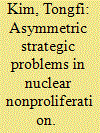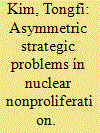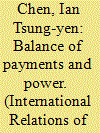|
|
|
Sort Order |
|
|
|
Items / Page
|
|
|
|
|
|
|
| Srl | Item |
| 1 |
ID:
137299


|
|
|
|
|
| Summary/Abstract |
This article explains cooperation problems between powerful democratic states and weak non-democratic states in the context of nuclear nonproliferation. Focusing on the interactions of the United States with North Korea, Iran, and Libya, it suggests that power asymmetry and information asymmetry foster mutual distrust by exacerbating two main strategic obstacles to cooperation: the time inconsistency of the stronger state's policy and the incomplete information regarding the non-democratic states. The nature of negotiations over nuclear weapons programs further exacerbates these problems. The overall implications of this article leave us pessimistic about the possibility of negotiated nuclear disarmament, but the theoretical analysis may help the negotiation strategy of the United States.
|
|
|
|
|
|
|
|
|
|
|
|
|
|
|
|
| 2 |
ID:
138093


|
|
|
|
|
| Summary/Abstract |
This article explains cooperation problems between powerful democratic states and weak non-democratic states in the context of nuclear nonproliferation. Focusing on the interactions of the United States with North Korea, Iran, and Libya, it suggests that power asymmetry and information asymmetry foster mutual distrust by exacerbating two main strategic obstacles to cooperation: the time inconsistency of the stronger state’s policy and the incomplete information regarding the nondemocratic states. The nature of negotiations over nuclear weapons programs further exacerbates these problems. The overall implications of this article leave us pessimistic about the possibility of negotiated nuclear disarmament, but the theoretical analysis may help the negotiation strategy of the United States.
|
|
|
|
|
|
|
|
|
|
|
|
|
|
|
|
| 3 |
ID:
138096


|
|
|
|
|
| Summary/Abstract |
Global economic imbalance leads to change in the global distribution of economic resources. While some foresee the inevitable decline of US power, others consider China’s forthcoming global primacy to be an exaggeration. This paper seeks to contribute to the debate by linking balance of payments (BOP) to power analysis. Dimensions of BOP are connected to Keohane and Nye’s two ideal-types of interdependence relationship: realist and complex interdependence. The former relates to the global distribution of aggregate economic resources; the latter emphasizes a detailed investigation of distinct interdependence situations between countries. China’s BOP from 1997 to 2012 is assessed through the lens of both ideal-type scenarios. The findings show that China’s growing power manifests principally in its rising status as a major global buyer in primary goods and its growing military strength in the region. However, China is confronted with possible slowdown in wealth accumulation and its lagging technological development. At present, the speculation of China’s upcoming global primacy may be exaggerated, but its dominant position in the region is indeed on the rise.
|
|
|
|
|
|
|
|
|
|
|
|
|
|
|
|
| 4 |
ID:
138094


|
|
|
|
|
| Summary/Abstract |
Middle power theory is enjoying a modest renaissance. For all its possible limitations, middle power theory offers a potentially useful framework for thinking about the behavior of, and options open, to key states in the Asia-Pacific such as South Korea, Japan and Australia, states that are secondary rather than primary players. We argue that middle powers have the potential to successfully implement ‘games of skill’, especially at moments of international transition. Frequently, however, middle powers choose not to exercise their potential influence because of extant alliance commitments and the priority accorded to security questions. We substantiate these claims through an examination of the Australian case. Australian policymakers have made much of the potential role middle powers might play, but they have frequently failed to develop an independent foreign policy position because of pre-existing alliance commitments. We suggest that if the ‘middle power moment’ is to amount to more than rhetoric, opportunities must be acted upon.
|
|
|
|
|
|
|
|
|
|
|
|
|
|
|
|
| 5 |
ID:
137302


|
|
|
|
|
| Summary/Abstract |
Middle power theory is enjoying a modest renaissance. For all its possible limitations, middle power theory offers a potentially useful framework for thinking about the behavior of, and options open, to key states in the Asia-Pacific such as South Korea, Japan and Australia, states that are secondary rather than primary players. We argue that middle powers have the potential to successfully implement ‘games of skill’, especially at moments of international transition. Frequently, however, middle powers choose not to exercise their potential influence because of extant alliance commitments and the priority accorded to security questions. We substantiate these claims through an examination of the Australian case. Australian policymakers have made much of the potential role middle powers might play, but they have frequently failed to develop an independent foreign policy position because of pre-existing alliance commitments. We suggest that if the ‘middle power moment’ is to amount to more than rhetoric, opportunities must be acted upon.
|
|
|
|
|
|
|
|
|
|
|
|
|
|
|
|
| 6 |
ID:
138095


|
|
|
|
|
| Summary/Abstract |
The 2007 Australian Parliamentary Elections brought a new dynamic to Australia’s foreign policy: the Kevin Rudd factor. The Prime Minister sought to develop a more proactive and multi-faceted foreign policy around ‘Creative Middle Power Diplomacy’. This study aims to cast light on the dynamism in Australia’s Foreign Policy with Kevin Rudd within the framework of middle power activism. The research firstly focuses on the difficulties of defining and classifying middle powers through which it will put forward specific ‘commonalities’ for successful middle power foreign policy outcomes. The study of the EU–Australia Partnership Framework and the Asia-Pacific Community proposals – both of which were priorities for Kevin Rudd – reveal the potential and limits of middle power activism. This study argues that in today’s world, middle powers have growing potential to pursue specific foreign policy goals but their ability to achieve these goals is constrained by Great Powers’ interests and consent, and also by the nature or ‘commonalities’ of middle power diplomatic practice.
|
|
|
|
|
|
|
|
|
|
|
|
|
|
|
|
| 7 |
ID:
138097


|
|
|
|
|
| Summary/Abstract |
The United States uses two forms of multilateralism to increase levels of foreign public support for military action: diplomatic multilateralism and operational multilateralism. Diplomatic multilateralism is typically done by obtaining a United Nations Security Council resolution authorizing military action. The use of multinational forces, the so-called coalition of the willing and many flags program, is an example of operational multilateralism. While scholars have empirical evidence that diplomatic multilateralism generates foreign domestic support for the use of force, there is no equivalent study for operational multilateralism. We do not know if or how much the two types of multilateralism would differ in inducing foreign domestic support for military action. This article, by using Japan as a field of survey experiment, answers these questions.
|
|
|
|
|
|
|
|
|
|
|
|
|
|
|
|
|
|
|
|
|